Breadcrumb
News archives
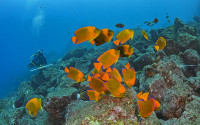
New Study: Protecting Large Ocean Areas Doesn’t Curb Fishing Catches
Five years after the creation of Mexico’s Revillagigedo National Park, the largest fully protected marine area in North America, experts report no negative impacts on the Mexican fishing sector
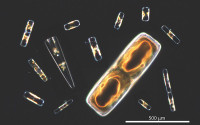
Phenomenal Phytoplankton: Scientists Uncover Cellular Process Behind Oxygen Production
One out of 10 breaths contains oxygen generated by cellular mechanism in microscopic algae
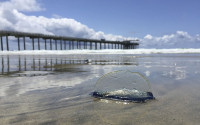
What Are Those Blue Blobs Washing Up On SoCal Beaches?
By-the-wind sailors have been spotted along the Southern California coastline this spring
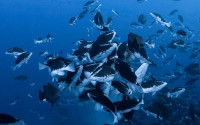
Researchers Track Endangered Nassau Grouper Eggs with Underwater Microscope
Scripps Oceanography researchers show fertilized eggs stayed local, but in some years drifted to nearby islands

Scripps Student Spotlight: Denise Alcantara
Journalist and current MAS Marine Biodiversity and Conservation student works to improve coral reef policy in the Philippines
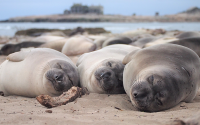
Elephant Seals Drift Off to Sleep While Diving Far Below the Ocean Surface
Brainwave patterns show elephant seals take short naps while holding their breath on deep dives, averaging just 2 hours of sleep per day while at sea
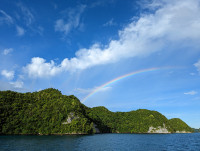
First Eight Island-Ocean Ecosystems Selected for Global Ridge-to-Reef Rewilding Campaign
Island-Ocean Connection Challenge aims to restore 40 globally significant island-ocean ecosystems by 2030

John McGowan: 1924-2023
Renowned biological oceanographer and World War II veteran drew link between ocean ecology and climate change
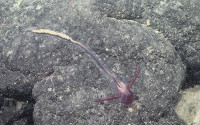
“Bizarre” Yoda Acorn Worm Makes Top 10 Marine Species List
Scripps Oceanography scientists officially described the deep-sea worm in 2022; now it’s among the top 10 new species acknowledged by the World Register of Marine Species

Scripps Student Spotlight: Eesha Rangani
Marine biology master’s student studying invertebrates, involving the systematics of deep-sea Nereidid worms
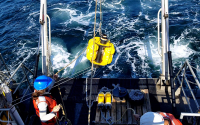
New Study Examines Noise Reduction from Retrofitted Shipping Vessels
Scripps Whale Acoustics Lab teams up with shipping giant Maersk to identify vessel designs that reduce radiated noise
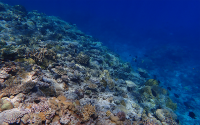
New Study Provides First Comprehensive Look at Oxygen Loss on Coral Reefs
Scripps Oceanography scientists and collaborators provide first-of-its-kind assessment of hypoxia, or low oxygen levels, across 32 coral reef sites around the world
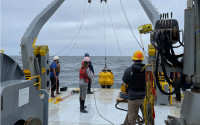
"Denoising" a Noisy Ocean
Scripps Oceanography researchers use machine learning to listen for specific fish sounds
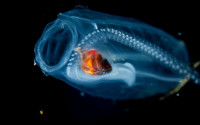
SalpPOOP Study Highlights Biogeochemical Importance of Zooplankton Fecal Pellets
Blooms of marine organisms transfer loads of atmospheric carbon into the deep ocean
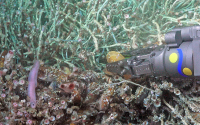
New Species of Deep-Sea Fish Discovered off Costa Rica
Scripps Oceanography researchers describe Pyrolycus jaco, a newly identified species of eelpout living in a hydrothermal seep in the deep ocean

Scripps Student Spotlight: Anela Akiona
PhD student and COP27 delegate from Waimānalo, Hawaiʻi focuses on coral reef ecology and how human intervention can help reefs be more resilient to climate change
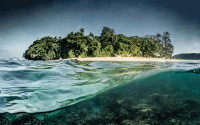
New research shows people, wildlife, and marine environment benefit when island-ocean connections are restored
A research and conservation collaboration highlights rewilding islands and breaking down artificial silos for big marine and terrestrial gains
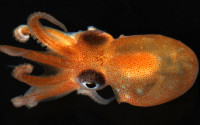
Rescued Octopus Provides Rare Chance for Researchers to Understand Life Cycle
Unexpected condition of deep-sea specimen leads to new scientific knowledge
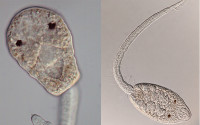
Parasites Associated with Eating Fish Showing Up in Southern California Fishing Locales
Snail that hosts potentially dangerous flatworms found to be widespread
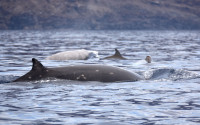
Ultrasonic Antifouling Devices Found Damaging to Whales
Study of Cuvier’s beaked whales off Mexico’s Guadalupe Island led to discovery

Scripps Student Spotlight: Kiirah Green
Master’s student researches deep-sea biology, with a focus on newly discovered species of deep-sea worms
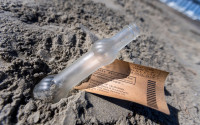
A Salad Dressing Bottle, a Postcard, and a Mystery
Chance find of a message in a bottle illuminates long history of ocean research
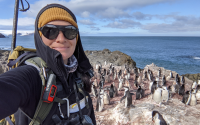
Diving into Seabird Science
The study of penguins and other seabirds takes flight through the research of Scripps PhD student Tammy Russell
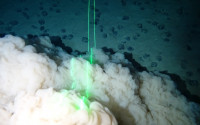
Study Gives New Insights into Nature of Deep-Sea Sediment Plumes
MIT-Scripps Oceanography team finds that sediment stirred up stays relatively close to seafloor

Environmental Scientist Jesse Ausubel to Receive 2022 Nierenberg Prize for Science in the Public Interest
Ausubel to deliver a free public lecture at Scripps Institution of Oceanography on Oct. 13
Pagination
Sign Up For
Explorations Now
explorations now is the free award-winning digital science magazine from Scripps Institution of Oceanography. Join subscribers from around the world and keep up on our cutting-edge research.